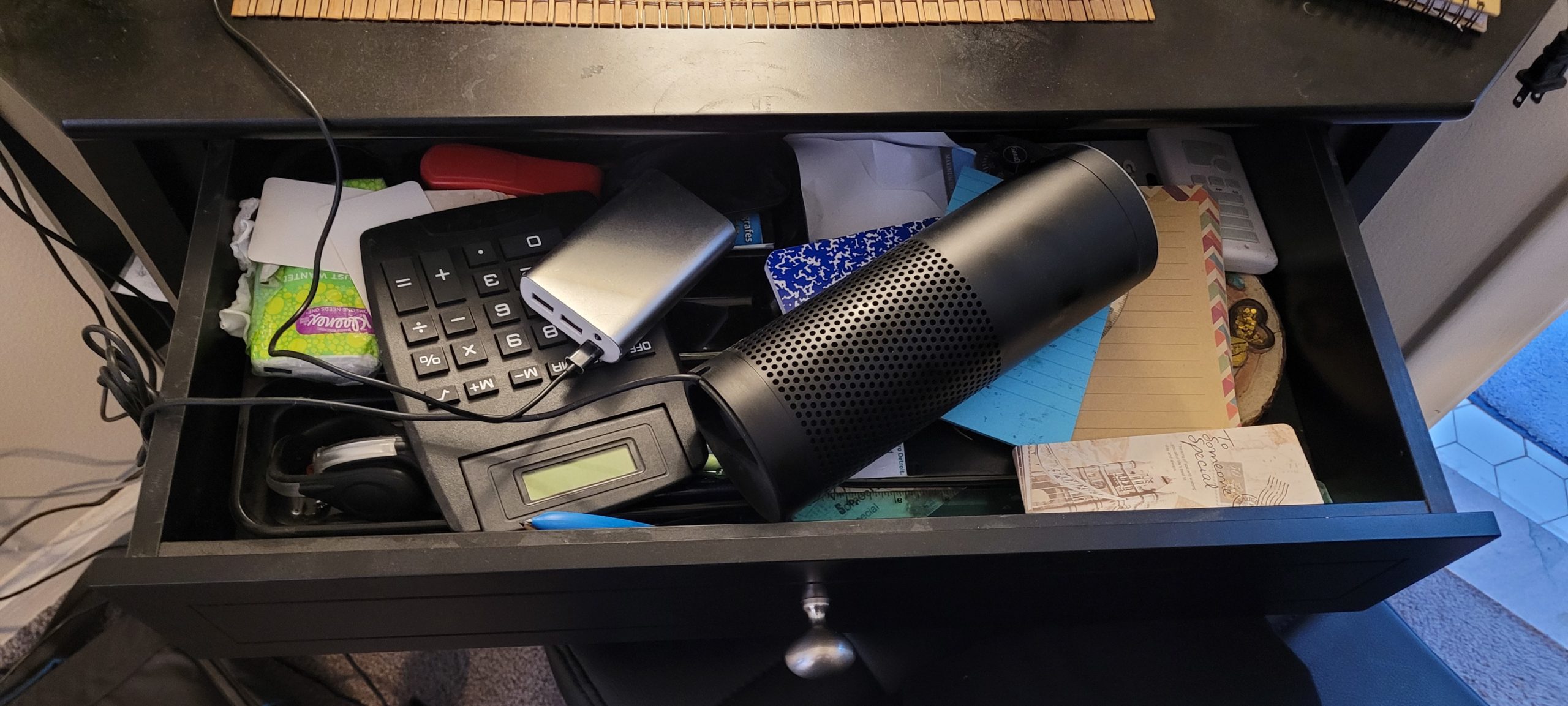
Recently, I blogged about the obvious slowdown in smart speaker growth. We saw the trend take shape in last year’s Techsurveys, especially among commercial radio fans. Our new Techsurvey 2022 is in the field as I write this post. We’ll be watching the trends on smart speaker acquisition, usage, and other key metrics very closely. Clearly, things are slowing down with this platform, and it’s important to understand why it’s happening.
For radio broadcasters, this trend is especially worrisome. That’s because almost every broadcast radio station is easily accessible on smart speakers. And during COVID, millions discovered they could listen to their favorite radio station at home – even if they don’t own a “regular radio.”
In our research among more than 40,000 core radio listeners in 2021, we learned that listening to a terrestrial radio station on Amazon, Google Home, and similar devices is becoming a prime “use case.” Yes, consumers are still asking Alexa for the weather, to convert kilometers to miles, and to listen to Pandora and Spotify. But more and more, they’re using smart speakers to tune in a favorite radio station.
You can see evidence of this in the chart below. I pulled up the results from Public Radio Techsurvey 2021. We asked smart speaker owners whether they’ve been listening to more, less, or the same amount of AM/FM radio since they acquired a smart speaker. A +15% net “listening more” percentage is impressive, and it underscores the increasing value of these gadgets to radio broadcasters.
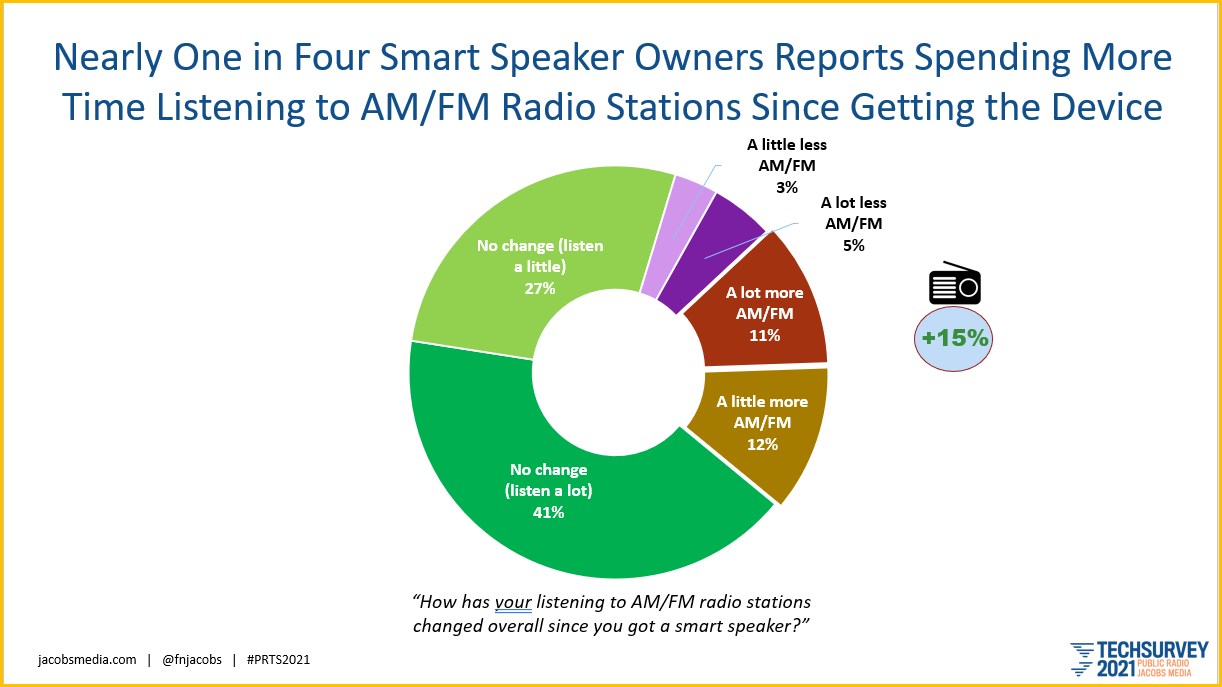
In a post last month – “Why Stalled Out Smart Speaker Sales Will Hurt Radio Broadcasters” – I addressed the slowdown in smart speaker ownership. When we ask consumers who don’t own one of these devices, privacy is a key factor. As we continually hear in focus groups, anti-Alexa consumers often say, “I’m not about to bring a device into my house that listens to my conversations.”
Now it turns out Amazon has seen this very same phenomenon in their research. Privacy is, in fact, a barrier to buying a smart speaker. But now, they’re discovering a speed bump among current owners of these devices.
A story by Bloomberg’s Priya Anand sums it up with this headline:
“Amazon’s Alexa Stalled With Users as Interest Faded, Documents Show”
According to Anand, internal memos from the Amazon camp detail how the company is trying to keep Alexa owners engaged. They indicate – as our research also shows – the initial growth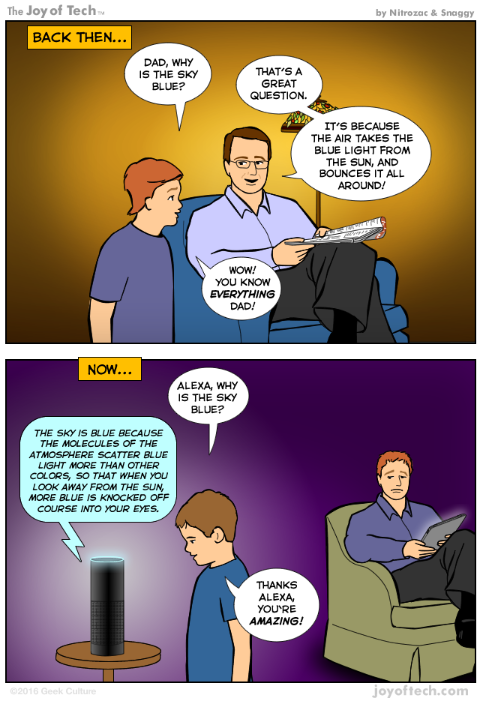 phase is stalled out. The estimate is only about a 1% growth rate over the next few years.
phase is stalled out. The estimate is only about a 1% growth rate over the next few years.
Whether you’re a radio company or the world’s largest online retailer, this is not an acceptable increase for a platform that planners hoped would become mass market.
Not surprisingly, Amazon disputes the way Bloomberg reads these documents. A spokesperson for the massive retailer pushed back at the notion that Amazon Echo products are slowing down:
“The fact is that Alexa continues to grow—we see increases in customer usage, and Alexa is used in more households around the world than ever before.”
Maybe, but there’s no denying a level of product fatigue. For many users, the magic has worn off. Bloomberg’s Anand asserts that beyond the privacy issues and a series of PR screwups, Amazon’s problem is more basic:
“People simply don’t find Alexa that useful.”
Part of the problem is that beyond basics like listening to music or setting the timer, “new Alexa users discover half of the features they will ever use within three hours of activating the device.”
Think about that. Anand points out that Amazon is working on motivating owners to interact differently with these devices, including Alexa Auto.
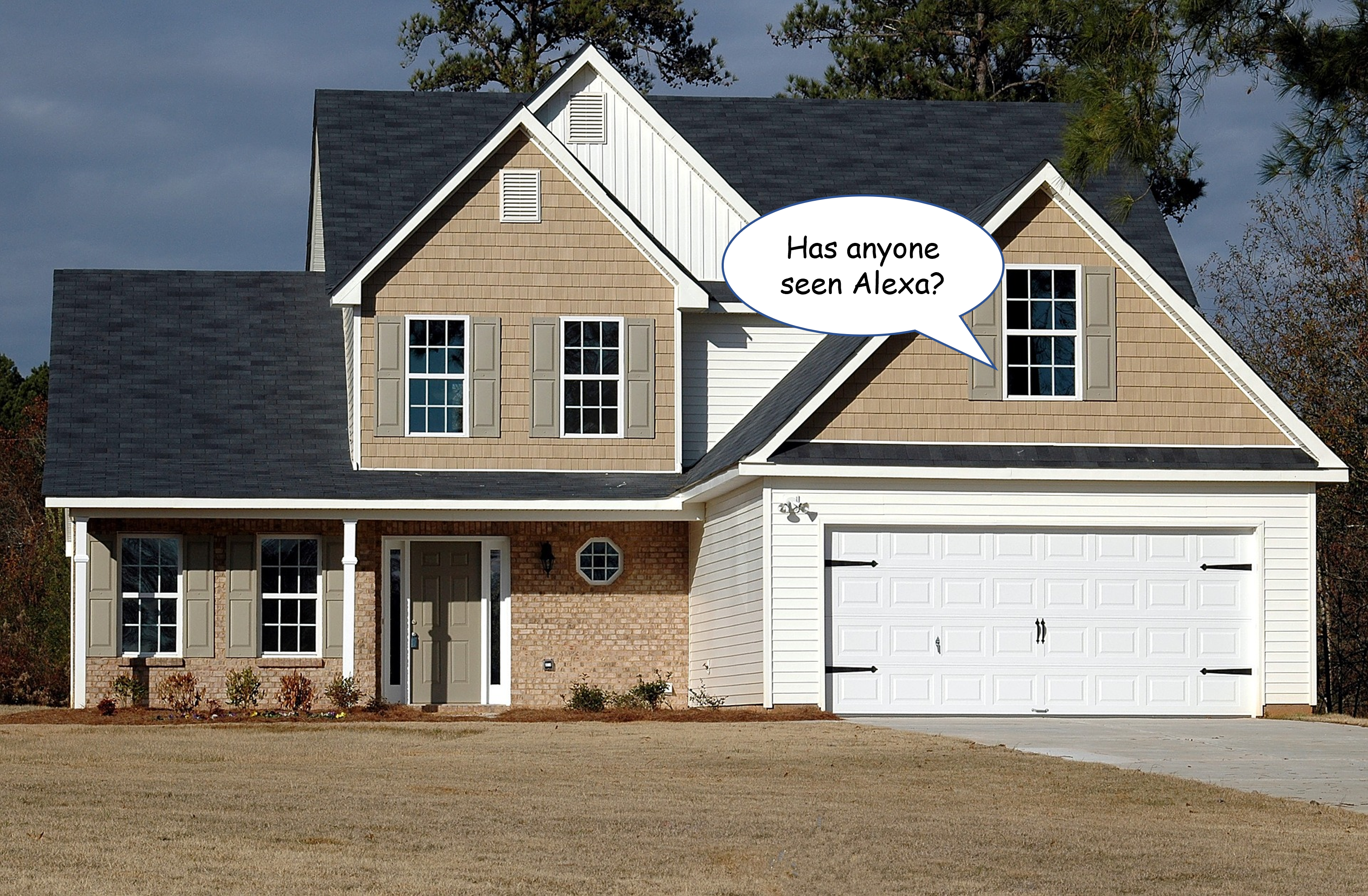 But a document from 2019 indicates that little progress has been made in expanding “use cases.”
But a document from 2019 indicates that little progress has been made in expanding “use cases.”
You have to wonder how many Alexa’s are sitting in closets or in junk drawers.
Obviously for Amazon, this is a conundrum – how to make these devices part of people’s routines – things they do every day out of habit.
I may have just the thing – a partnership with radio.
Now before you laugh me off, walk with me for a minute, and let’s think about the possibilities. We know from our experience and our research that a lot of radio listeners tune in their favorite stations out of habit.
In this case, this means radio is part of their daily routines. Most of us are, in fact, creatures of habit. When radio listening is part of that activity, it can be a great thing.
These are the people who love hearing a certain morning show on music stations, or a daily public radio program, a provocative talk show, or the play-by-play broadcast of a local sports team. We see these folks in focus groups all the time. Many tell us they can pretty much know whether they’re late for work, for school, or an appointment when listening to a preferred piece of radio content.
Instead of trying to encourage, urge, or goad consumers to start using Alexa more often, why not tie its usage to something they’re already doing? After all, there is no Alexa habit. The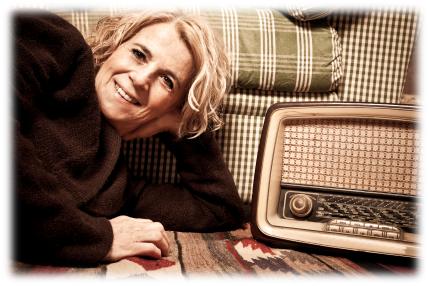 repeated use comes from consumers who enjoy something – repeatedly. Yes, radio listening. And Amazon could lean into it.
repeated use comes from consumers who enjoy something – repeatedly. Yes, radio listening. And Amazon could lean into it.
What if the radio broadcasting industry proposed a partnership with Alexa? To make sure there’s impact, it could be a collaboration with the best stations in the top 100 markets. The idea would be to buy advertising schedules “5-deep” in each of these metros – running targeted Alexa ads on the five highest-rated stations in each market. The theory being that popular stations are doing something right to engender steady time-spent listening – that is, habit-forming. loyal usage.
The ads (perhaps voiced by Alexa) would encourage listeners of each station to listen in on Amazon Echo devices, along with the proper command. A pre-roll for Alexa would run ahead of each station’s stream.
In that way, Amazon taps into something it simply cannot instantly grow, manufacture, or buy – habitual usage in every market in the country, reflecting an Alexa activity that many are already doing.

Who makes the proposal? Maybe it’s a combo effort among the RAB and NAB.
And come to think of it, I’m in Las Vegas right now for CES. Erica Farber lives here, and the newly minted CEO of the NAB, Curtis LeGeyt (pictured), will be addressing our tour groups at our dinner tomorrow night.
Maybe even between courses, I float the idea.
Stay tuned.
- Media And Technology In 2025: Believe It Or Not! - April 18, 2025
- In Radio, You Just Never Know - April 17, 2025
- The Secret To Making A Great Podcast (And Great Radio) - April 16, 2025




Fred: Good points, but broadcasters need to remember that radio listening through Alexa comes with a cost – increased royalties to SoundExchange as Alexa accesses digital streams (which pay the royalty) not the over-the-air signal (which does not). So there is a cost that comes with increased listening on any digital platform for which a broadcaster must plan until more reasonable royalty rates can be worked out. See my article here for more information: https://www.broadcastlawblog.com/2018/11/articles/hey-alexa-remind-me-how-much-you-are-increasing-my-soundexchange-music-royalties/
David, as much as it pains me to say it, I think it’s time for radio to let go of the “streaming expense” excuse, and lean into a technology that allows stations and shows access on devices as diverse and popular as smartphones, tablets, and smart speakers. Our Techsurveys are pretty clear – even among radio’s most fervent and loyal fans, regular radios are disappearing from homes and workplaces like a leaky tire. And the trend will never reverse itself. Streaming is the price of doing business in this century, and the quicker broadcasters accept and even lean into that, the better off they’ll be. Thanks for commenting on this one.
No question- but broadcasters need to be prepared for the significant additional costs – and the different expense model – as each additional listener costs them more in increased royalties
David, it’s the cost of doing business in 2022. The 50% margin days are long over. Hopefully, see you at an SBA conference soon!
Happy new year, Fred.
I’m sitting here, having my morning coffee, listening to my favorite stations thru my kitchen Alexa device.
Yup, you’re right. I listen to stations, set timers, and up in bedroom, set alarms.
But not much more…except for asking for the occasional “fart” noises.(yes, I’ve done that).
Stay safe out there in Vegas. Can’t wait to hear your tech updates!
Excellent thought, Fred. Alexa’s problem was self-created as you point out. If they hadn’t lied about what they were doing when the device was sitting quietly on the bedside table or kitchen counter the public would not have had a reason to unplug in the first place. And they now realize they don’t really “need” a smart speaker.
Amazon could use a boost, and radio can certainly provide it for a price. For now, It’s still much simpler to flip on a radio. And it’s usually a better listener experience. Thanks for leading on radio’s behalf, Fred!
Jack, I think the simplicity and seamlessness (when it works, that is) of Alexa and smart speakers can bring a feeling of convenience to radio listening. Radio can’t do much on the privacy issues, but it can help introduce/reinforce the idea of radio listening on smart speakers. Thanks, Jack.
You are spot on Fred. The smart speaker is not much more than connected radio receiver and it has the power to bring radio back into the homes and business that no longer have a AM/FM tuners. It could be the thing that navigates our industry through the next decade of choppy waters. The radio industry has as much to gain as the smart speaker industry does through such an arrangement.
Indeed, Tom. Thanks for that thumbs-up.
Go for it –
Boy, Fred, it’s rare that I hear an idea I truly believe is “win-win,” with most being either “win-lose” or “I-win-big-and-you-get-a-bone-for-letting-me-use-you.” But this really stands out as an idea with great upside potential for both sides. Bring Alexa along for dinner so she can remind you to float this truly great idea between courses. (And by the way, yes, I DID ask Alexa why the sky is blue and yes, she DID give the exact answer as in the cartoon. Darn it, Fred, why do you DO this to me?!?)
David, thanks for this. I’m glad the collab concept passed muster with you – and others. (And yes, that’s an old cartoon.)
This is a good idea and Erica Farber would give a great presentation to the marketing folks at Amazon. A really good case could be made for it.
As for Alexa, in my experience, it doesn’t work all that well – maybe that’s why the ceiling is so low. It usually can’t find my Spotify playlists/Pandora stations and often says that services I’ve connected it to aren’t. I have a mesh system and Alexa likes to connect to the weaker router and then, think its not on the same network as my phone and not connect to it.
My Alexa would be in my junk drawer if it didn’t do a great job with its shopping list. You can speak items (it recognizes them well) or add them to a list via the Amazon app, which whos the collective list on everyone’s phone, including who added each item. It it weren’t for that, the last question I would ever ask would be, “Alexa, where can I recycle this POS?”
I agree with you wholeheartedly about Erica’s ability to make the sale. It’s a win-win for radio and Amazon across different dimensions.
There’s much about this technology that is problematic, and you refer to that in your comment. But it’s ability to “tune in” a radio station makes it easier than on an FM radio. And if Amazon is concerned about expanding Alexa’s repertoire of tasks, we all know some great talent in every market who could do wonderful live reads as well as catchy videos.
Thanks, Bob.
As for tuning in radio stations on a smart speaker, Fred, yes it’s usually easy but I feel compelled to remind us all of radio’s greatest hidden strength: the robustness of the audio chain, from transmitter direct to receivers without intervening IP devices and networks. That is, when the power goes down (which the grids do more often these days because of omitted infrastructure maintenance and improvement) all you need is a battery-powered radio to reconnect to important sources of information and entertainment, since broadcasters usually maintain emergency generation capacity for reasons both commercial and public-service. We’ve yet to see a battery powered smart speaker for obvious reasons.
Will it require a large, national outage–Texas 2021 writ large–before the general population realizes what it has been relinquishing in recent years? Just as supply-chain problems have led to industrial reshoring, maybe it’s time to “reshore” radio listening.
You’re right, John. A major emergency when those call towers go down is a harsh reminder why those battery operated radios are so valuable – along with the content they’re transmitting. Problem is, the moment things go back to normal, those old habits return. Thanks for the comment, as always.
Well then, let’s just make some specs spots…
Have you seen the production director?
Fred, excellent article and I completely agree with you when you say “As much as it pains me to say it, I think it’s time for radio to let go of the “streaming expense” excuse, and lean into a technology that allows stations and shows access on devices as diverse and popular as smartphones, tablets, and smart speakers.”
Tomorrow, my blog will be about how I listen to ALL of my radio via streaming and why I think that’s the future of radio around the world.
I think you and Paul, as well as the readers of your blog, will find what I have to say of interest and why it’s a wake-up call for the radio industry.